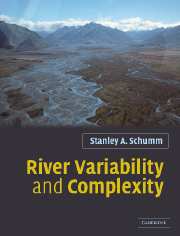Chapter 13 - Floods
Published online by Cambridge University Press: 05 June 2012
Summary
Floods (Figure 1.2) normally affect almost all of the length of a river but, of course, there are exceptions. For example, the flood may only impact the downstream reaches of a channel or an upstream flood may have its effects dissipated downstream. However, except for extreme events that not only modify the channel, but also the valley, the impacts are ephemeral, being lost as the channel readjusts during floods of lesser magnitude.
Floods produced by local events such as the failure of landslide dams will be discussed in Chapter 15. Here are considered hydrologic events caused by climatic conditions. Wohl (2000b, p. 167) states these conditions as: “A flood may cause dramatic changes along some reaches of a channel and have relatively little effect on other reaches. Similarly, a flood that occurs once every hundred years may create erosional and depositional forms that are completely reworked within 10 years along one channel, but that persists for decades along a neighboring channel.”
Stream channels in eastern Australia decrease in size downstream contrary to hydraulic geometry rules (Nanson and Young, 1981a, b). The reason is that the floods go overbank downstream and the channels convey only part of a flood. Also in Australia, Warner (1987a, b) identified periods of higher and periods of lower average rainfall and flooding. These flood-dominated regimes (FDR) and drought-dominated regimes (DDR) tend to persist from 30 to 50 years. The FDR have mean annual discharges from two to four times greater than DDR.
- Type
- Chapter
- Information
- River Variability and Complexity , pp. 127 - 132Publisher: Cambridge University PressPrint publication year: 2005



